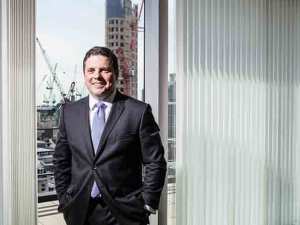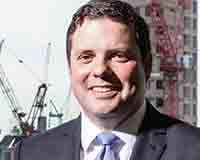
Softly spoken and baby-faced, it might be easy to underestimate Roman Kogan’s depth of experience and height of responsibility.
As of last month, Deutsche Bank’s new European head of commercial real estate leads the most active real estate lending bank in Europe. It completed €5bn (£3.5bn) of deals last year – a figure it expects to exceed in 2015.
Its capital markets and syndication team, headed by Bhavesh Patel, has been at the forefront of the resurgence of the much-maligned CMBS market since the downturn and its special situations team, headed by David Ruiz since the departure of Charles Blackburn to Oaktree Capital Management in April, is still a force in buying mainly distressed real estate and credit.
Kogan, 40, was a US Navy submarine officer before he embarked on his banking career 11 years ago and has spent weeks submerged deep beneath the seas of the Caribbean, Mediterranean and North Atlantic.
That experience has taught him much about client confidentiality – “I could tell you, but I’d have to kill you,” he jokes of his time in the military – and has also helped him to navigate Deutsche Bank through some choppy waters.
Last month, the two co-chief executives of the German banking giant, Jürgen Fitschen and Anshu Jain, resigned following protests over job cuts in its home country and a record fine for its involvement in Libor rigging. The duo were replaced by John Cryan, a senior executive at Singaporean state-owned investment company Temasek.
Similar instability was experienced within Deutsche Bank’s property department. Elad Shraga, the bank’s New York-based head of structured finance and the man in overall charge of real estate, was the first to leave in May to set up his own fund. He was followed by Jonathan Pollack, the bank’s well-respected global head of real estate, who left to join Blackstone. Soon afterwards European real estate head Gad Caspy also announced his departure.
For the credibility of its real estate business, it was perhaps just as well the bank had a ready replacement in Kogan, former European head of origination, whom Caspy had groomed for the top job.
Deutsche Bank has been a crucial partner for many investors, particularly those that have pushed the boundaries into new markets and undertaken deals of scale since the economic recovery. Kogan’s leadership of his team will be watched closely by borrowers and rivals alike.
“While we had incredible leadership under Elad,
Jonathan and Gad, the commercial real estate business is greater than the people who run it. It’s not like the business falls apart without them,” says Kogan. “We have the skillset and the ability to transact across the entire risk profile of commercial real estate. There is no one else that competes across the entire risk spectrum like we do.”
Deutsche Bank takes a different approach from most other investment banks that are active in the real estate sector by having a particularly broad view on what business it will write.
“I have never been a believer in the originate-to-distribute model that was popping up in the market a few years ago,” says Kogan. “I think you need to run this business as a franchise business. We need to provide liquidity and balance sheets to our clients. We can’t just be elephant-hunting.
“I don’t run a five-person team trying to do a couple of one-off deals, we’re constantly looking for new opportunities.”
Deutsche Bank’s European real estate team is 30 strong and although it handles a lot of small deals, it also takes down some of the biggest elephants.
Last year, in a deal led by Kogan himself, the bank completed the largest single refinancing in Europe – a €1.5bn deal with German property company IVG
which also led to a €679.9m CMBS.
“We are obviously very proud of the IVG transaction,” he says. “It showed our strength across the platform – our ability to underwrite large size, ability to then take that large exposure and distribute it in both loan syndication format and in CMBS down to an appropriate risk level.”
The IVG CMBS was one of four that Deutsche Bank issued last year, totalling €2.2bn, more than any other issuer. Notably, it completed the first Irish and Dutch CMBS deals this cycle, and is now preparing the first CMBS in the Iberian market.
Although the European CMBS market is recovering, it suffered reputational damage for poor underwriting during the previous cycle and is minuscule compared with the US. Kogan is disappointed that the European market is not stronger, but says the lag to the US market is not entirely down to fear among investors.
“The biggest challenge is to originate at appropriate economics that offer an appropriate kind of risk-adjusted profit opportunity to do securitisations, and that’s because of competition from balance sheet lenders and others,” he says.
When originating, Kogan does not want his team to simply assume they can ditch the risk they have taken on. He wants to make sure they undertake responsible lending. Over time, Deutsche Bank has kept about one-third of all the loans on its books, an unusually high figure for an investment bank.
“We always look at transactions as if we are going to be holding them as whether we syndicate or whether we securitise, we are still going to be holding a portion of the position.”
The number of opportunities the bank’s special situations business has had to assess has fallen markedly since the market recovered, and in the US resulted in Deutsche Bank selling off $2bn (£1.3bn) of its business to TPG last November. This fuelled rumours that it would make a similar move in Europe, especially after Blackburn’s departure to Oaktree in April.
Kogan insists that despite not being able to compete with the likes of Lone Star and Cerberus on the largest transactions, Deutsche Bank will not be closing down its special situations business. He points to the €97m purchase of the heavily distressed Project Maeve portfolio of €785m loans, bought from NAMA last month, as a transaction ideally suited to its strengths.
“We continue to look for appropriate opportunities where we can to deploy capital in the best possible manner with an acceptable risk profile,” he adds.
Kogan is keen to ensure the bank takes on an appropriate amount of risk, particularly in the level of leverage offered – something that was forgotten by many institutions in the previous cycle.
“At some point, you know a correction will come,” he says. “What we can perhaps help influence [in terms of moulding market behaviour] is leveraged buying. That is, making sure that leverage
is at sensible levels, which I think the market as a whole has done well, and making sure there are appropriate equity cushions going into transactions.”
As well as other traditional bank lenders, Deutsche has in recent years had to compete with an increasing number of alternative financiers in the market, such as debt funds and insurance companies, but Kogan says the rise of such players is positive for the market as a whole.
“That is probably the major change between the market today and the market, say, seven or eight years ago,” he says. “Is it good for Deutsche Bank? On some transactions, yes; on some transactions, no.
“It’s good to have somebody to act as a liquidity provider
to sell some risk to, to sometimes partner with. And, on the downside, to compete with,” he says.
The real estate market has been plain sailing in recent times, and Deutsche Bank’s upheaval has been an unusually choppy ride. But with Kogan now in control, things should soon be much calmer.
CV: Ronan Kogan
Roman Kogan began his banking career at Deutsche Bank in 2004 following the completion of a Finance MBA at Columbia Business School, New York.
He spent two years with the bank in credit structuring before moving to Merrill Lynch to work in the structured credit team as a structurer.
Enticed back to Deutsche Bank in 2010 originally on its structured solutions team, he moved to the real estate team he now heads.
Before banking, Kogan
was an officer in the US Navy and served on submarines under the Mediterranean, Caribbean and North Atlantic.
He obtained an undergraduate degree in Electrical Engineering from the United States Naval Academy.











